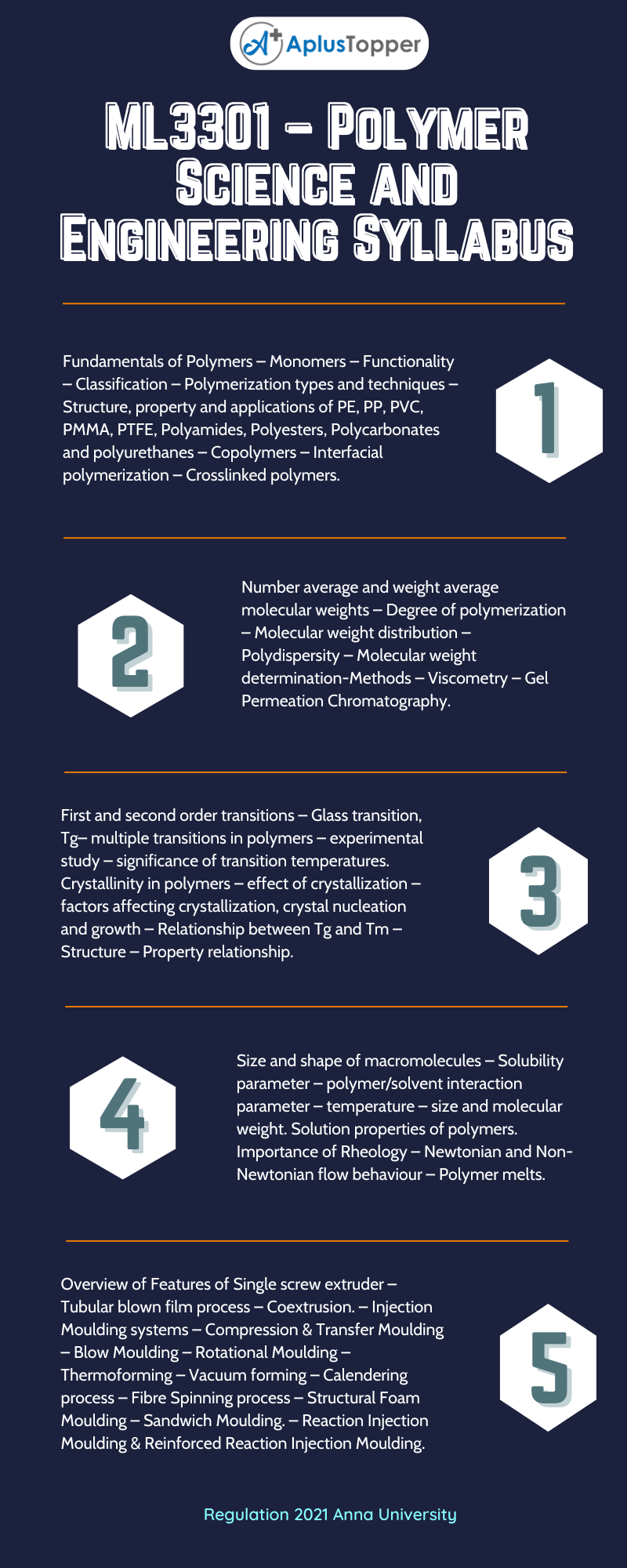Polymer Science and Engineering is the subject of semester III of Anna University B.E Material Science And Engineering Syllabus. In this article, we are glad to provide the syllabus of polymer science and engineering part of Semester III Subjects in the first-year course.
We intend to provide the subject code ML3301 – Polymer Science and Engineering syllabus based on regulation 2021 by Anna University. You can get an idea of the topics in the syllabus of polymer science and engineering. We hope that the absolute idea on the syllabus will assist the students in avoiding confusion of revision according to weightage. We also include required textbooks and references. If you require anything regarding the syllabus you can comment in the below section. Hope you like this information. Don’t forget to share.
If you want to know more about the syllabus of B.E. Material Science And Engineering connected to an affiliated institution’s four-year undergraduate degree program. We provide you with a detailed Year-wise, semester-wise, and Subject-wise syllabus in the following link B.E. Material Science And Engineering Syllabus Regulation 2021 Anna University.
Aim Of Objectives:
The main learning objective of this course is to prepare students for:
- Understanding the basics of polymers, its formation and polymerization types.
- Getting acquainted with the significance and the molecular weights of polymers.
- Characterizing the polymers for their thermal behaviour and solution properties.
- Gaining knowledge on the thermodynamics of polymer dissolution and the factors influencing them.
- Identifying suitable polymer processing methods for polymer products.
ML3301 – Polymer Science and Engineering Syllabus
Unit – I: Polymers And Polymerization
Fundamentals of Polymers – Monomers – Functionality – Classification – Polymerization types and techniques – Structure, property and applications of PE, PP, PVC, PMMA, PTFE, Polyamides, Polyesters, Polycarbonates and polyurethanes – Copolymers – Interfacial polymerization – Crosslinked polymers.
Unit – II: Molecular Weights Of Polymers
Number average and weight average molecular weights – Degree of polymerization – Molecular weight distribution – Polydispersity – Molecular weight determination-Methods – Viscometry – Gel Permeation Chromatography.
Unit – III: Transitions In Polymers
First and second order transitions – Glass transition, Tg– multiple transitions in polymers – experimental study – significance of transition temperatures. Crystallinity in polymers – effect of crystallization – factors affecting crystallization, crystal nucleation and growth – Relationship between Tg and Tm – Structure – Property relationship.

Unit – IV: Solution Properties Of Polymers
Size and shape of macromolecules – Solubility parameter – polymer/solvent interaction parameter – temperature – size and molecular weight. Solution properties of polymers. Importance of Rheology – Newtonian and Non-Newtonian flow behaviour – Polymer melts.
Unit – V: Polymer Processing
Overview of Features of Single screw extruder – Tubular blown film process – Coextrusion. – Injection Moulding systems – Compression & Transfer Moulding – Blow Moulding – Rotational Moulding – Thermoforming – Vacuum forming – Calendering process – Fibre Spinning process – Structural Foam Moulding – Sandwich Moulding. – Reaction Injection Moulding & Reinforced Reaction Injection Moulding.
Text Books:
- Bahadur and Sastry, “Principles of Polymer Science”, Narosa Publishing House, 2002.
- Morton Jones D. H., “Polymer Processing”, Chapman & Hall, New York, 1995.
References:
- Billmayer Jr. and Fred. W., “Textbook of Polymer Science”, WileyTappers, 1965.
- Crawford R.J, Plastics Engineering (3rd Ed), Pergamon Press, London (1987).
- Fried J. R., “Polymer Science and Technology”, Prentice Hall, 1995.
- Gowarikar, “Polymer Science”, Johan Wiley and Sons, 1986.
- Griskey G., “Polymer Process Engineering”, Chapman & Hall, New York, 1995.
Related Posts Of Semester – III:
- MA3351 – Transforms and Partial Differential Equations
- ML3391 – Mechanics of Solids
- ME3351 – Engineering Mechanics
Must Read:
